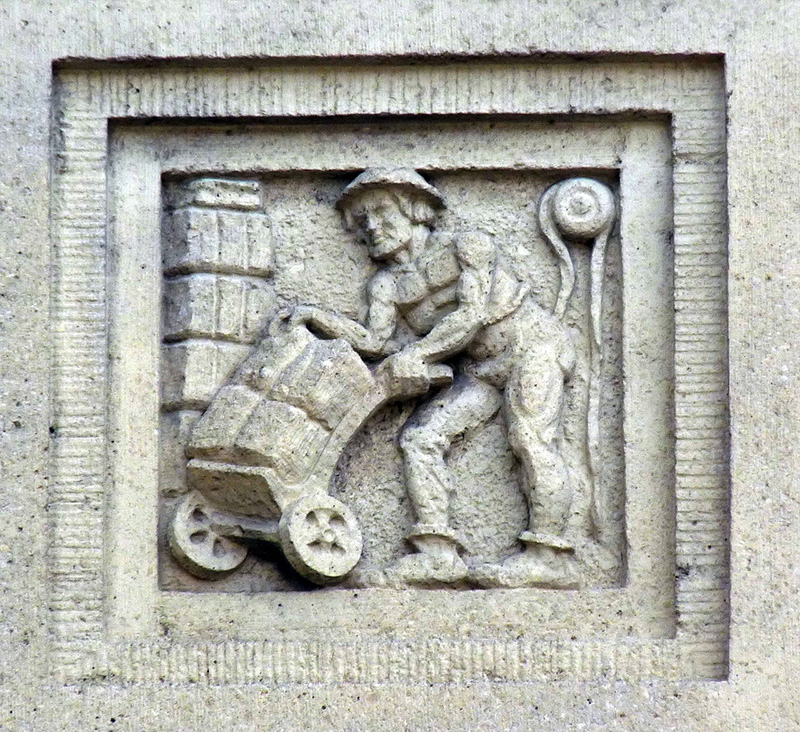How Being a Manual Laborer Helped Me Write a Better PhD Dissertation
"I have seen slaves on horseback, and princes walking on foot like slaves." — Ecclesiastes 10.7
Graduate students live off of temporary employment—often manual labor—since we move constantly and frequently spend only short periods of time in one area. However, some of us are fortunate enough to have work fall in our lap that pays well, demands little, and comes with newfound status. We all know of students who land these jobs because they list the job on their CV and publicize this work experience. Oftentimes these students assume that the readers of their CV will see a direct relationship between the job and the strengthening of a particular skill they want to highlight; these students are correct to assume this, in part, because we give certain forms of employment instant social esteem.
I have never listed one of my manual labor jobs on my CV or resume, though this has been a constant source of income since the end of high school (I’ve been a janitor, grocery store clerk, and grain elevator laborer, to name a few). This is because I know that no one will care, and it will certainly not grant me any esteem or status for doing this kind of “unskilled” labor. But that unskilled labor actually enhances a number of job skills, particularly for academics. In my experience, this kind of work helped me write a better dissertation—a project that I completed in one year. Here’s how:
1. Building a House (or, Being Forced to Assume Total Personal Responsibility)
I recall a few summers ago after the BP oil spill in the Gulf, I briefly watched the questioning of the BP CEO about his role in the spill. After several minutes of innocuous palaver, the questioners again restated their question. The answer that was provided, again in a swirl of meaningless euphemism and doublespeak, was that as CEO he would have to delegate responsibility to the person who was in charge of this particular BP facility. In other words, as CEO, he claimed to have played no role in this environmental disaster.
We manual laborers watch in horror and amusement at the way blame can so easily be passed off. This is simply because when we are performing a task as CEO of the broom, hammer, or tool, it is very clear whether the job has been done well or done poorly. There is no way to skirt one’s personal responsibility in one’s work and to attempt to do this is, in many cases, rather humorous, as well as potentially professionally disastrous.
As a dissertation writer, I often thought of my dissertation as a house I was trying to construct on my own (houses, like dissertations, either have integrity or don’t, and one cannot skirt responsibility). My committee was supervising the job, making suggestions, and telling me when boards were not level, etc. A dissertation is fundamentally a work of massive organization and care. Building a house from scratch is no different. Also, in both cases, if you screw up in one place it can unsettle the entire project. Thus manual labor makes the dissertation writer assume responsibility and focus on the organization needed to successfully complete the task.
2. Fighting through the Grind (and Disabling Anxiety)
Manual labor trains the body, mind, and spirit to fight against unrelentingly difficult odds. It is similar to what William James famously described as the moral equivalent of war. This kind of strenuous living is critical to successfully completing one’s dissertation. Additionally, the fatigue that comes with manual labor complements the writing well because it is so physically exhausting. This can aide in the disabling of any anxiety that surrounds one’s life and the writing process.
In the midst of the grind of manual labor, one is forced to focus on the immediate moment (if you don’t, you will injure yourself or others) and this focus on the immediate moment does two things: it disables all anxiety (freeing up energies) and can make you extremely bored. Boredom that comes from manual labor is extremely useful because it is a bodily desire for intense mental activity (the kind that working on a dissertation can satiate). Thus in fighting through the grind, one’s mental and physical energies are most effectively deployed and work in tandem with each other. In my own experience, this helped me write a very good dissertation in a considerably short amount of time, in spite of the hours I logged performing seemingly pointless, physically taxing, and repetitious activity that paid back very little in terms of monetary compensation.
3. Kindred Spirits
Working as a manual laborer immediately introduced me to other sojourners or people living unconventional lives. Many of these individuals are well educated or have been lauded with various professional honors but simply have no interest in the prevailingly common professional identities today—such as wearing a tie and handling money. These people made my journey less lonely and offered me opportunities for friendship in a place I would not have necessarily expected it. Oftentimes, even if I never became very close with my coworkers, simply knowing that they existed and were working towards their dreams helped me to remain faithful to my own. A PhD, and a dissertation specifically, are extraordinarily solitary exercises. Manual labor, in part, ensured that I wasn’t entirely alone.
Lastly, as a PhD student and a manual laborer it is easy for everyone to like you, simply because you have no aspirations to become a foreman. As a result you are something of a celebrity—you pose no threat to anyone by virtue of your presence and you are encouraging to everyone. Having everyone on your side like this can make the job more tolerable and, at times, humorous. These days when I walk into the dairy box at the local grocery store for my weekend shift, everyone announces with pleasure, "The Doctor Is IN!"
"Unskilled" labor takes a considerable amount of skill for successful execution. It supports as well as generates emergent skillsets for individuals that are particularly relevant to academic success and academic employment. I suggest that the lack of esteem that our academic culture has for laborers, especially in the larger society, is indicative of a kind of corrosive sloth. In conferring dignity to workers, we confer dignity to ourselves and make the dreaming of dreams much more easy and felicitous, thereby making the attainment of dreams a possibility that can be realized.
 Joseph M. Kramp is a May 2012 PhD graduate of Drew University’s graduate division of religion. While living in the New York City area, Kramp taught as an adjunct professor at Marymount Manhattan College and John Jay College (CUNY) in Manhattan. Upon graduation from Drew University, Kramp and his family relocated to southwest Florida, where he is an adjunct professor at a number of schools—Edison State College, Florida Gulf Coast University, and several others. A manual laborer throughout his life, Kramp has worked for Trader Joe’s grocery store from New Jersey to Florida. Kramp’s Trader Joe colleagues affectionately refer to him as "Doc."
Joseph M. Kramp is a May 2012 PhD graduate of Drew University’s graduate division of religion. While living in the New York City area, Kramp taught as an adjunct professor at Marymount Manhattan College and John Jay College (CUNY) in Manhattan. Upon graduation from Drew University, Kramp and his family relocated to southwest Florida, where he is an adjunct professor at a number of schools—Edison State College, Florida Gulf Coast University, and several others. A manual laborer throughout his life, Kramp has worked for Trader Joe’s grocery store from New Jersey to Florida. Kramp’s Trader Joe colleagues affectionately refer to him as "Doc."
 By Ecelan (Own work) [GFDL or CC-BY-SA-4.0-3.0-2.5-2.0-1.0], via Wikimedia Commons
By Ecelan (Own work) [GFDL or CC-BY-SA-4.0-3.0-2.5-2.0-1.0], via Wikimedia Commons
- Log in to post comments
 Printer-friendly version
Printer-friendly version






